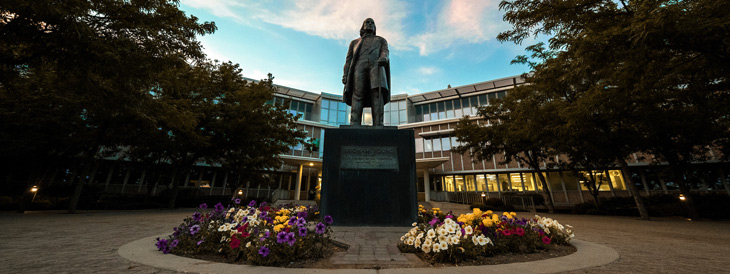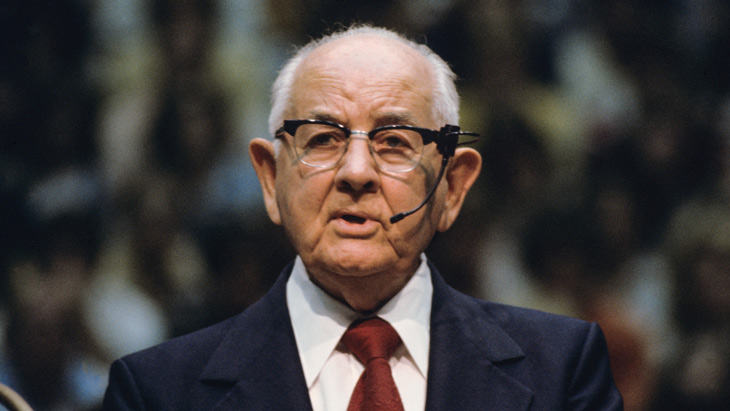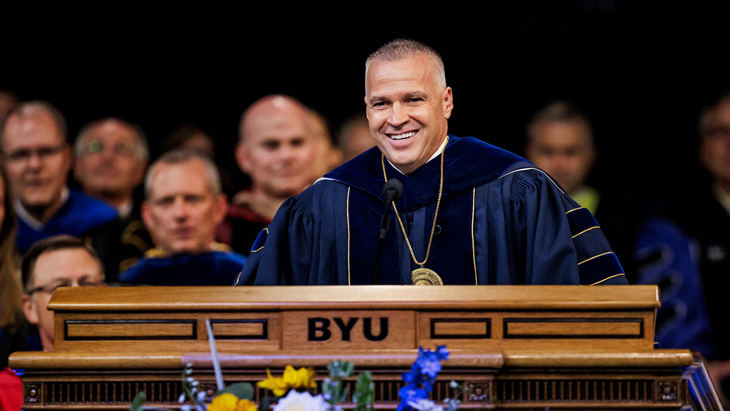Fostering BYU’s “Double Heritage,” one of seven Becoming BYU initiatives put forward by President C. Shane Reese in his inaugural response, is a companion to the Developing the Courage to Be Different initiative discussed at the PLC meetings in October 2024. These are two sides of the same coin. Both are about living the gospel of Jesus Christ.
Developing the courage to be different is about standing up and standing out. Jointly fostering our scholarship and discipleship is more inward; it’s striving to be a Christian, a Saint, and a scholar in everything we do, and it deepens as we share what we believe.
Let your light so shine before men, that they may see your good works, and glorify your Father which is in heaven.
—Matthew 5:16
President C. Shane Reese on Fostering BYU’s “Double Heritage”

BYU faculty are specifically charged with being “bilingual” in their discipline and in their discipleship, but when I talk about our “double heritage,” I try to emphasize that this applies to our students, faculty, staff, and alumni—we expect this way of living to manifest itself in the work of everyone who is part of the BYU community.
Many of our students are excellent in conversing in the language of the Spirit, just as they are in the language of their discipline of choice. A prominent example of this is our UNIV 101 course. It is inspiring to listen to these students talk about how they see their role at BYU as they learn that we care about their ability to be bilingual. I think our employees are going to have to up their game because we have so many students who are so prepared and engaged in that aspect of their holistic education.
Becoming BYU will require that we embrace our religious mission even as we speak to the broader academy with credibility and strength. The most natural academic settings to do this are in the research, scholarship, and mentoring we do with students. We expect our courses to have rigorous, intellectually enlarging components. But we also expect them to be spiritually strengthening. We expect BYU faculty and staff to be role models.
Interestingly, our involvement in the Big 12 athletic conference has given us new opportunities to have these conversations in academic disciplines. Sometimes it looks like a networking meeting where we’re brainstorming how to share the Big 12 message. Other times it happens in discussion with academic support units. Before we can amplify the gospel message, we must bring our expertise to those discussions.
An analogy to consider is with our sports teams: BYU Athletics can more effectively shine the gospel light when we’re competitive on the field, court, track, floor, diamond, or pool. That same thing is true in academic endeavors. When we’re excellent in our respective spheres, we get more opportunities to shine our unique light. Being competent in our disciplines creates opportunities to show that we’re Christians in word and in how we treat other people.
That competence allows for our scholarship to be recognized and taken seriously in key places. These things feed off each other. This is why I say that I believe that we will be successful in our academic or disciplinary pursuits, not in spite of our religious mission, but precisely because of our religious mission.
I manage my schedule so that I can interview half of all the new faculty hires. Academic Vice President Justin Collings does the other half. In those interviews, we explain that we want faculty who are excellent in their disciplines, but we also expect them to be strong disciples who model what a life of faith looks like. We are asking them to do double duty at BYU, and I always ask, “How does this strike you?”
I love it when people respond to this question by saying that that this approach allows them to be their full, authentic self. At BYU we remove constraints. So rather than adding an element to their work, BYU gives them an opportunity to be who they truly are.
I recognize that it’s not going to be that way for everybody. For some, it’s going to be a learned skill. I don’t expect everybody walking through the door to understand how to embrace their double heritage or how to lean into being bilingual on day one. But I do expect them to want to do it. And if they want to do it, then I think they’re entitled to heaven’s help in doing it. And I know they’ll be successful.
This perspective also applies to students and the entire BYU community. We must purposefully embrace and foster our double heritage. Being bilingual is not a check-the-box way of living. If it feels forced, it doesn’t fit with a person’s effort to have a truly Christlike life. It’s got to be authentic; it’s got to be natural; it’s got to be normal.
Sometimes sharing our testimonies of the gospel happens in formal settings, but I don’t think that happens every day. We can share our testimonies daily by living the gospel. And we shouldn’t shy away when we feel prompted to share something that is meaningful to us. Being bilingual isn’t centered on what we “must do” but instead on what we “feel prompted to do.” It ought to be normal and natural and not forced. It requires effort and faith and is a lifetime endeavor.
One key way in which we demonstrate that we are striving to be bilingual is how we treat other people. We treat others the way the Savior would treat them—with love. President Russell M. Nelson said this:
“One of the easiest ways to identify a true follower of Jesus Christ is how compassionately that person treats other people.” (“Peacemakers Needed,” general conference, April 2023)
Based on a BYU News article.
From the BYU Mission Statement

- All instruction, programs, and services at BYU, including a wide variety of extracurricular experiences, should make their own contribution toward the balanced development of the total person.
- The university must provide an environment enlightened by living prophets and sustained by those moral virtues which characterize the life and teachings of the Son of God.
- All students at BYU should be taught the truths of the gospel of Jesus Christ.
- All relationships within the BYU community should reflect devout love of God and a loving, genuine concern for the welfare of our neighbor.
- Students at BYU should receive a broad university education.
- Students who graduate from BYU should be capable of competing with the best in their fields.
- Scholarly research and creative endeavor among both faculty and students . . . are essential and will be encouraged.
Read the BYU Mission Statement
From “The Second Century of Brigham Young University,” President Spencer W. Kimball (October 10, 1975)

Your double heritage and dual concerns with the secular and the spiritual require you to be “bilingual.” As scholars you must speak with authority and excellence to your professional colleagues in the language of scholarship, and you must also be literate in the language of spiritual things. We must be more bilingual, in that sense, to fulfill our promise in the second century of BYU.
BYU is being made even more unique, not because what we are doing is changing but because of the general abandonment by other universities of their efforts to lift the daily behavior and morality of their students.
We hope that our friends, and even our critics, will understand why we must resist anything that would rob BYU of its basic uniqueness in its second century. As the Church’s commissioner of education said on the occasion of the inaugural of President Dallin H. Oaks:
“Brigham Young University seeks to improve and 'sanctify' itself for the sake of others—not for the praise of the world, but to serve the world better.” (Elder Neal A. Maxwell, “Greetings to the President,” November 12, 1971)
That task will be persisted in. Members of the Church are willing to doubly tax themselves to support the Church Educational System, including this university, and we must not merely “ape the world.” We must do special things that would justify the special financial outpouring that supports this university.
As the late President Stephen L Richards once said, “Brigham Young University will never surrender its spiritual character to sole concern for scholarship.” BYU will be true to its charter and to such addenda to that charter as are made by living prophets.
Read and watch the entire address
From “Becoming BYU: An Inaugural Response,” President C. Shane Reese (September 19, 2023)

The faculty and staff who foster this double heritage must be bilingual: They must speak with authority about their disciplines in the language of scholarship, and they must speak with power about their Christian discipleship in the language of faith. As we strive to become the BYU of prophecy, we must develop ourselves in things both secular and sacred. When secular and sacred truths reinforce one another, we must embrace both. But when secular claims conflict with revealed truth, we must mark the difference. As we move forward in this great cause of becoming the BYU of prophecy, may we recognize the purpose for our gathering as we work together to build disciple leaders.
Read and watch the entire address




